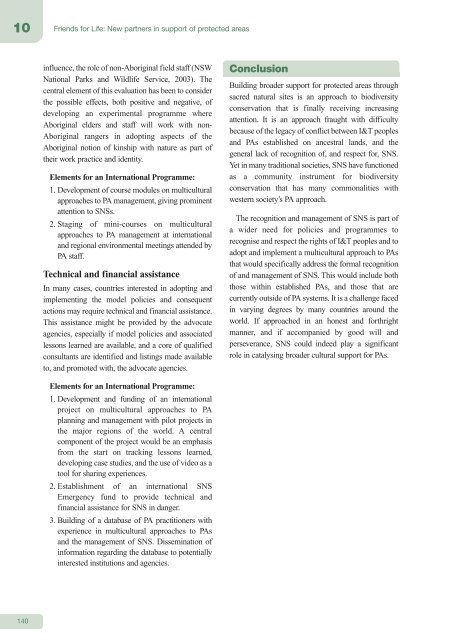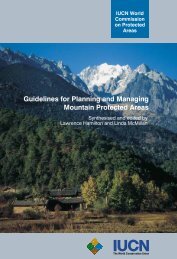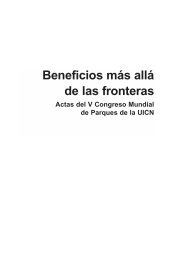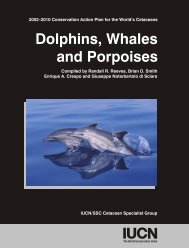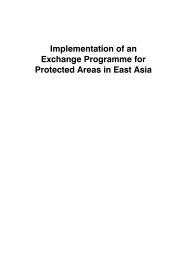1.Front section - IUCN
1.Front section - IUCN
1.Front section - IUCN
You also want an ePaper? Increase the reach of your titles
YUMPU automatically turns print PDFs into web optimized ePapers that Google loves.
10<br />
Friends for Life: New partners in support of protected areas<br />
influence, the role of non-Aboriginal field staff (NSW<br />
National Parks and Wildlife Service, 2003). The<br />
central element of this evaluation has been to consider<br />
the possible effects, both positive and negative, of<br />
developing an experimental programme where<br />
Aboriginal elders and staff will work with non-<br />
Aboriginal rangers in adopting aspects of the<br />
Aboriginal notion of kinship with nature as part of<br />
their work practice and identity.<br />
Elements for an International Programme:<br />
1. Development of course modules on multicultural<br />
approaches to PA management, giving prominent<br />
attention to SNSs.<br />
2. Staging of mini-courses on multicultural<br />
approaches to PA management at international<br />
and regional environmental meetings attended by<br />
PA staff.<br />
Technical and financial assistance<br />
In many cases, countries interested in adopting and<br />
implementing the model policies and consequent<br />
actions may require technical and financial assistance.<br />
This assistance might be provided by the advocate<br />
agencies, especially if model policies and associated<br />
lessons learned are available, and a core of qualified<br />
consultants are identified and listings made available<br />
to, and promoted with, the advocate agencies.<br />
Conclusion<br />
Building broader support for protected areas through<br />
sacred natural sites is an approach to biodiversity<br />
conservation that is finally receiving increasing<br />
attention. It is an approach fraught with difficulty<br />
because of the legacy of conflict between I&T peoples<br />
and PAs established on ancestral lands, and the<br />
general lack of recognition of, and respect for, SNS.<br />
Yet in many traditional societies, SNS have functioned<br />
as a community instrument for biodiversity<br />
conservation that has many commonalities with<br />
western society’s PA approach.<br />
The recognition and management of SNS is part of<br />
a wider need for policies and programmes to<br />
recognise and respect the rights of I&T peoples and to<br />
adopt and implement a multicultural approach to PAs<br />
that would specifically address the formal recognition<br />
of and management of SNS. This would include both<br />
those within established PAs, and those that are<br />
currently outside of PA systems. It is a challenge faced<br />
in varying degrees by many countries around the<br />
world. If approached in an honest and forthright<br />
manner, and if accompanied by good will and<br />
perseverance, SNS could indeed play a significant<br />
role in catalysing broader cultural support for PAs.<br />
Elements for an International Programme:<br />
1. Development and funding of an international<br />
project on multicultural approaches to PA<br />
planning and management with pilot projects in<br />
the major regions of the world. A central<br />
component of the project would be an emphasis<br />
from the start on tracking lessons learned,<br />
developing case studies, and the use of video as a<br />
tool for sharing experiences.<br />
2. Establishment of an international SNS<br />
Emergency fund to provide technical and<br />
financial assistance for SNS in danger.<br />
3. Building of a database of PA practitioners with<br />
experience in multicultural approaches to PAs<br />
and the management of SNS. Dissemination of<br />
information regarding the database to potentially<br />
interested institutions and agencies.<br />
140


